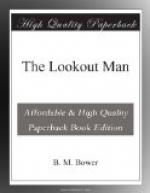There was his mother hiding herself away from her world in a sanitarium. It was like her to do that—but it was hard to know he had broken up all the pleasant, well-ordered little grooves of her life; hard to know how her pride must suffer because he was her son. She would feel now, more than ever, that Jack was just like his father. Being like his father meant reproach because he was not like her, and that was always galling to Jack. And how she must hate the thought of him now.
He wished savagely that Marion Rose could go home. He wanted to be alone with his loneliness. It seemed to him now that being alone meant merely peace and contentment. It was people, he told himself finally, who had brought all this trouble and bitterness into his life.
He wished she would go and leave him alone, but that was manifestly impossible. Angry and hurt though he was, he could not contemplate the thought of letting her go down there into that blackened waste with the thick sprinkling of bonfires where stumps were all ablaze, fallen tangles of brush were smoldering, and dead trees flared like giant torches or sent down great blazing branches. She might get through without disaster, but it would be by a miracle of good luck. Even a man would hesitate to attempt the feat of working his way across the burning strip.
There was no other place where she could go. She could not go alone, in the dark, down the mountain to any of the lower ranches. She would get lost. A man would not try that either, unless forced to it. A man would rather spend the night under a tree than fight through miles of underbrush in the night. And she could not take the old Taylorville road down to Indian Valley, either. It was too far and too dark, and a slight change of the wind would send the fire sweeping in that direction. She might get trapped. And none of these impossibilities took into account the prowling wild animals that are at the best untrustworthy in the dark.
She would have to stay. And he would have to stay, and there did not seem to Jack to be any use in making a disagreeable matter still more disagreeable by sulking. He discovered that he was hungry. He supposed, now he came to think of it, that Marion Rose would be hungry, too. The protective instinct stirred once more within him and pushed back his anger. So he turned and went back to the little station.
Marion had lighted the little lamp, and she was cooking supper over the oil stove. She had found where he stored his supplies in a tightly built box under a small ledge, and she had helped herself. She had two plates and two cups set out upon his makeshift table, and while he stopped in the door she turned from the stove and began cutting slices of bread off one of the loaves which Hank had brought that day. With her head bent toward the lamp, her hair shown like pale gold. Her face looked very serious—a bit sad, too, Jack thought; though he could not see where she had any reason to be sad; she was not hiding away from the law, or anything like that.




